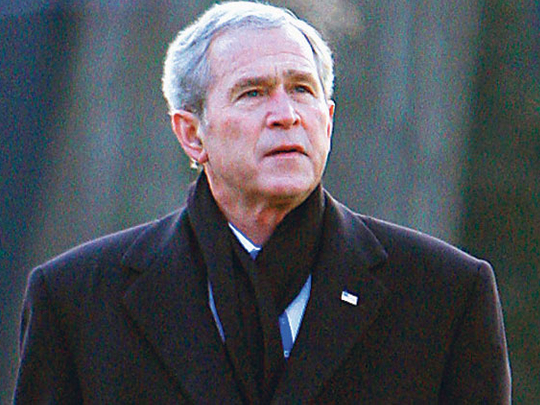
This morning in the US the much anticipated memoirs of former US president George W. Bush, Decision Points, will go on sale for $35 (Dh128.7). Bush timed the release for just after the midterm elections in the US to avoid the distraction of being asked for his views on candidates during the promotional tour.
For the past week, leaked passages from the book have appeared in the international media, revealing what went through the mind of the 43rd US president — for example, after the terrorist attacks in New York on September 11, 2001. This controversial leader, loathed throughout the Arab and Muslim world, finally tells us why he waged two long wars on Afghanistan and Iraq and left crumbling states in his wake in Palestine, Pakistan, Lebanon and Sudan.
Bush is clearly unapologetic about all that he did, but in one of his speeches prior to the book release, he admitted that his biggest regret was not finding WMDs in Iraq. He also claimed he was misled by the CIA. Bush, who jokes that his domestic policy now constitutes nothing but taking out the trash and washing the dishes, relates a very distorted version of events during one of the worst chapters in Arab-US relations.
Contrary to popular lore in the US or what grassroots Arabs believed, the man was no fool and was not being manipulated by anybody — either in the US or Israel. He had a clear objective in US-Arab relations and knew exactly what he was doing when he promoted the "Saddam has WMDs" argument, sent his troops into Iraq, confined Yasser Arafat to an office in Ramallah, refused to punish Israel for any of its atrocities (memorably in Jenin) or allowed the Israeli army to mercilessly bomb the Gaza Strip weeks before he left the White House.
Publication of presidential memoirs is a long-held tradition in the US ever since the Second World War, upheld by every president except John F. Kennedy, who was famously shot before completing his presidential term, in November 1963. No president has been as controversial as Bush, however, and certainly nobody else managed to single-handedly damage America's image in all four corners of the globe.
Despite brief appearances on one or two occasions, Bush let his former team do all the talking for him, notably his vice-president Dick Cheney, who has been ever-present in the media since, defending the unpopular policies of the Bush era.
Bush, however, was completely silent, sinking into oblivion as his two predecessors Bill Clinton and Jimmy Carter graced the world stage; monitoring elections, mediating conflict and globe-trotting to meet with decision-makers. As recently as last month, an Associated Press poll showed that 55 per cent of Americans disapproved of Bush and blamed him, rather than Barack Obama, for the country's ongoing economic crisis. And it is precisely for this reason that Bush's memoirs have created such a buzz.
Among the notable passages in the Bush memoirs are his confession that he toyed with the idea of sacking Cheney in 2004, and that he approved the torture of Al Qaida prisoners because he believed it "saved lives". However, Bush says that the most difficult moment in his presidency was when rapper Kanye West said that he "doesn't care about black people" because of his timid response to Hurricane Katrina in 2005. Bush was heavily criticised for feeling "deeply insulted" by the remarks, whereas he should have been more devastated by the hurricane itself, which killed no less than 1,836 people and destroyed property worth $81 billion (Dh297.9 billion).
Much more to come
To date, however, no snippets have been released about the prelude to the Iraq War or the chaos that erupted there after March 2003. Nothing has been leaked either about Guantanamo Bay, Abu Ghraib or Osama Bin Laden. We don't know what Bush will say about his handling of the Palestinian Intifada, the massive raid on Ramallah, or the suspicious death of Arafat.
What about the murder of Rafik Hariri, the Lebanese-Israeli war of 2006 or the Gaza war? The leaks have showed, however, that Israeli prime minister Ehud Olmert asked Bush to bomb Syria in 2007, and that the US president discussed the idea with his top officials, but backed out because "bombing of a sovereign state without warning or justification would greatly affect the prestige of the United States".
To learn more, we will have to buy the Bush memoirs and perhaps "fill in the blanks" once Julian Assange releases more classified material on his website, WikiLeaks. Only last week, the Australian announced that he would soon release secret documents related to Lebanon, a country that at one point in 2005 was a high priority for Bush and the neocons. In October, WikiLeaks showed that torture did indeed happen in Iraqi prisons, under the nose of US officers who knew about it and turned a blind eye.
All Decision Points really tells us is that Bush apparently had no moral problem with prisoners being tortured, in either Guantanamo or Abu Ghraib. Understanding what happened during the Bush era would have been much easier had Arab leaders penned their memoirs too, telling their side of the story. They would no doubt have explained that their people were wronged and their countries were used and abused for eight long years by the Bush White House.
Sami Moubayed is editor-in-chief of Forward Magazine.










